Internal School conference celebrates recent research successes and projects happening within animal, rural and environmental sciences
The annual School research conference saw project showcases from PhD candidates, academic staff and research assistants.
By Laura Phillips | Published on 29 September 2022
Categories: Research; School of Animal, Rural and Environmental Sciences;
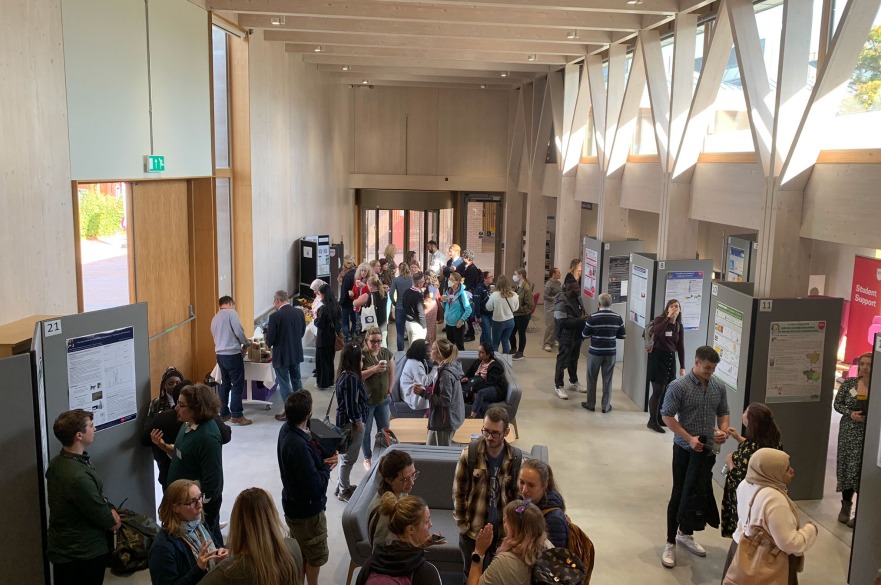
Last Friday, the School of Animal, Rural and Environmental Sciences (ARES) hosted its annual internal research conference, giving academic staff the chance to present what they have been working on, and giving doctoral students an opportunity to present their research to an audience – some for the first time – comprising the ARES research community of PhD candidates, Masters programme students and academic staff.
The conference began with an opening address by Professor Andrew Hirst, Associate Dean for Research at the School. Professor Hirst introduced the conference to attendees, as well as attributing a few words to the School’s recent research successes in the latest Research Excellence Framework (REF) results, in which 83% of the Nottingham Trent University’s (NTU) research activity was classed as either world-leading or internationally excellent.
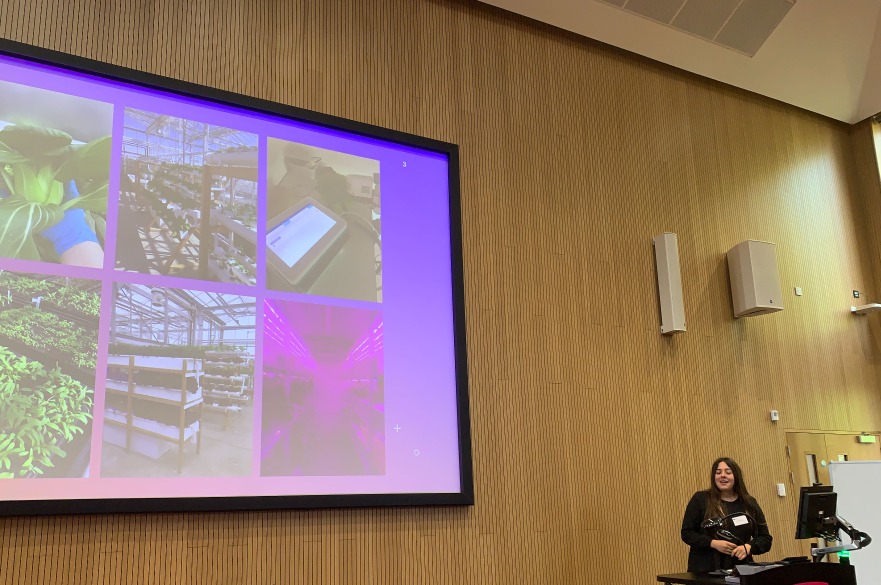
PhD candidate Xanthea Heynes presents research on block chain technology in the UK food supply chain.
The day was split into four sessions, with first year PhD student Xanthea Heynes kicking off session one, chaired by Dr Hirst, with her research into how block chain technology can be used to optimise the UK food supply chain by simplifying data management and creating a more transparent food system. Following this, Soojin Oh spoke about her study into how crops can be fortified with Vitamin B12 using nanoparticle technology and hydroponics. Next, PhD candidates Sulochana Gunasena and Chiemela Steve Odoemelam presented their projects on using biostimulants to increase crop tolerance to drought; and In Silico ligand docking approaches to develop a viable drug candidate to treat Type 2 Diabetes, respectively.
Academic staff members of the ARES research community also presented their current projects – Dr Heather Cameron-Whytock (Senior Lecturer in Equine Science) spoke about her research, aiming to reduce injury and as a result, fatalities, within equestrian eventing using big data and AI to analyse and predict the risks; and Dr Samantha Bremner-Harrison (Course Leader for MSc/ MRes Endangered Species Recovery and Conservation), who outlined the role and importance of the NTU ARES Species Recovery Unit in a range of national and international species recovery programmes.
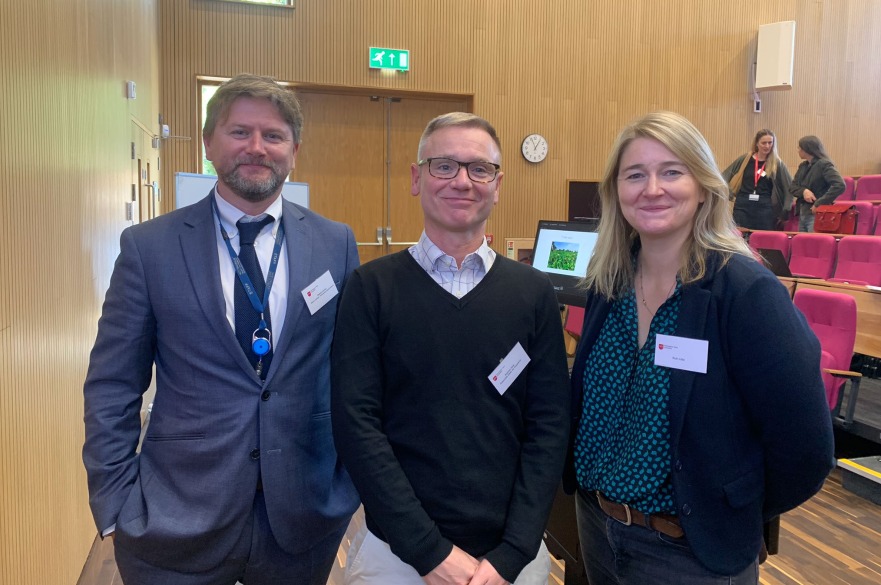
Dr Stephen Harrison, Professor Andrew Hirst and Dr Ruth Little (left to right).
After a coffee break, which allowed attendees to visit PhD students’ research posters, session two – chaired by Dr Helen Hicks – began with Stephen Harrison (Module Leader in Animal/ Zoo Sciences and Conservation) discussing his latest study into the diversity of the major histocompatibility complex (MHC) – which can determine how long a species survives – within the Arctic fox, in which the study has collected over 176 different Arctic fox samples; who was followed by Dr Andrew Hirst with his study into variation in the degree of sexual size dimorphism (SSD) among fish.
Session two featured Invited Speaker for the day, Dr Ruth Little, who divides her time working as lecturer in Human Geography at the University of Sheffield and within the Department for Environment, Food and Rural Affairs (Defra), reflecting on her career so far, including the topic of ‘Getting social science evidence into agri-environmental policy development’.
Following a networking lunch, session 3 – chaired by Dr Carrie Ijichi – was initiated by PhD candidate Chloe Lucas, who spoke on her research into increasing co-existence between carnivores and communities in South Africa. Next, Muhammed Naeem discussed his project into how varied diets, particularly low-density crude protein can affect chicken gizzard histological development. Following this, Felicity Couldwell presented her study into how different buffering agents affect the characteristics of frozen equine spermatozoa; and Nourhan Abdelaal spoke about the successes of her study into survival rates of rearing mealworms using waste streams, such as food and sea waste.
Associate Professor of Zoo Animal Welfare, Dr Samantha Ward went next, presenting her research into captive carnivore welfare, in which data on 25 species of captive carnivores has been collated and analysed. Following this, Associate Professor of Ecology, Dr Richard Yarnell, showcased his decade of research into hedgehogs, which aims to challenge assumptions into hedgehog ecology and conservation, while also highlight how this research can contribute to future conservation.
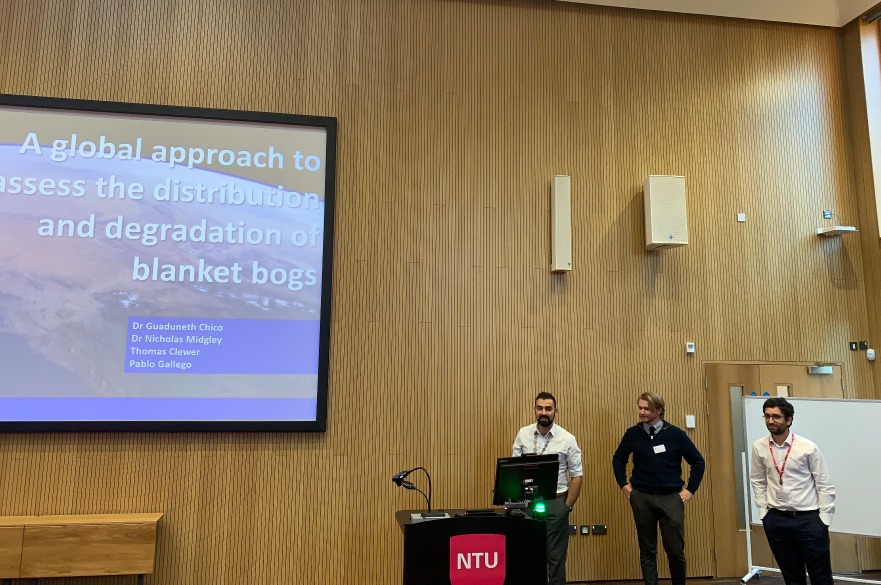
Dr Guaduneth Chico, Thomas Clewer and Pablo Gallego present research on Blanket Bog degradation and restoration (left to right).
The final session of the day began after another coffee and poster break, chaired by Esther Kettel. Emily Hall, a PhD candidate kicked off the session with her research into heat-related illness (HRI) in dogs, using big data from the VetCompass database. Her study has developed an HRI grading system from the human classification to better identify the severity of HRI in dogs to help save more lives. Next, Jessica Johnson presented her study into how regularly you ride a horse can help you predict the outcome of equestrian eventing footage, which is aiming to help develop training programmes for equestrian athletes and educators. To finish off the PhD presentations for the day, Sumaiya Afrin and Kat Hamil, discussed their studies on reducing phosphorus pollution from poultry production by formulating livestock feed; and how supplemental feeding effects the conservation and population of red squirrels, respectively.
The penultimate presentation for the day came from Dr Savannah Worne (Lecturer in Ecology and Environmental Science), talking on her latest project which is investigating the impact of wastewater discharge and climate on ecosystem health at Rutland Water. Finally, Dr Guaduneth Chico (Lecturer in Environmental Science), along with research assistants, Thomas Clewer and Pablo Gallego, presented ongoing global research into the identification and documentation of peatland and Blanket Bog degradation, and how it can be restored; a hugely important project considering these ecosystems contain more than 1.5 times the amount of carbon held in the atmosphere
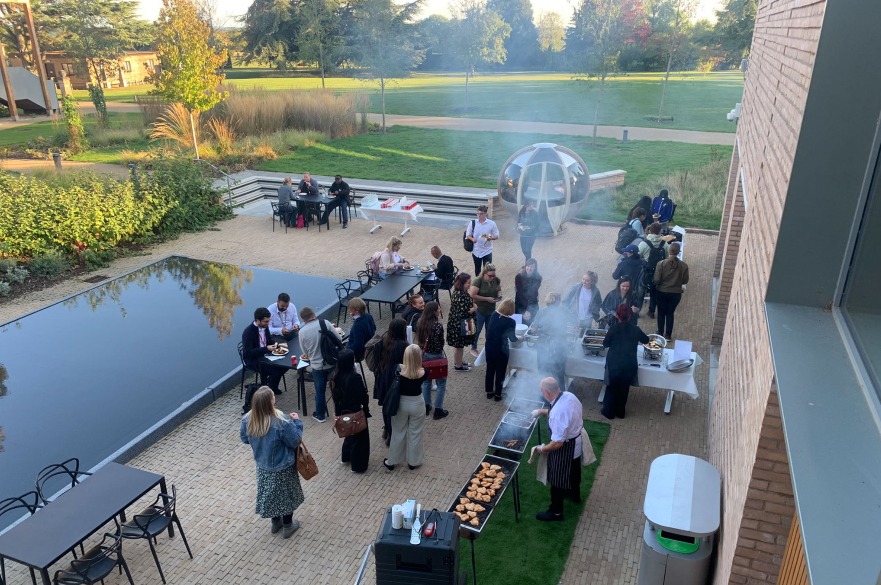
Attendees network at the closing event BBQ by the Lyth mirror pool.
The day was brought to a close with a BBQ and awards ceremony, celebrating involved PhD candidates, which announced Xanthea Heynes as the winner of the prize for best research presentation; Hannah Jenkins as the winner of the best research poster; and Weito Sun as the winner for their notable research excellence throughout their PhD programme.
For more information on the day and further detail on research projects, take a look at the conference programme.